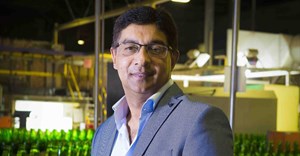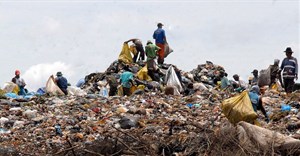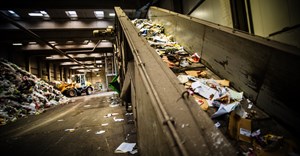
Related



EPR - What does it mean for waste in South Africa?
Shabeer Jhetam 6 Nov 2020


Lockdown relief secured for waste pickers
14 Apr 2020


Africa's bumpy road to sustainable energy
Eleni Mourdoukoutas 12 Nov 2018


The company also announced that current fiscal recoveries have grown steadily and in November 2009, a record 26 673 tons of glass was recovered for recycling.
"These recycling rates would not have been possible were it not for the combined commitment of our industry shareholders to pushing up the glass recycling rates. This includes government, the glass manufacturers and fillers," says TGRC's GM, Shabeer Jhetam.
These figures are expected to continue to climb with the signing of the Environmental Waste Management Act in June 2009. This Act will aid in the development of a more sophisticated recycling industry and South Africans can expect a more regulatory environment as part of government's drive to achieve a zero waste society by 2022. The government now has the ability to impose new waste management plans, including various targets and penalties for non-compliance, onto industry. Municipalities must also begin to develop integrated waste management plans that think beyond landfills. Government and industry will have to work closely together in order to achieve the targets that will be put in place.
Stoney Steenkamp, MD of Nampak Wiegand Glass, which sits on the TGRC board, says that Nampak is 100% committed to the glass recycling process in South Africa. The manufacturing company has begun installation of a R160-million glass recycling plant at its Roodekop site. The plant, which is expected to be operational by the end of March 2010, has a capacity of 185 000 tons per annum and can take mixed cullet, and reportedly represents the single largest investment into glass recycling in South Africa.
"The timing and installation of this recycling plant is closely linked to The Glass Recycling Company's targets and we believe with all the extra capacity we can now absorb, the new recycling rates set should be far easier to meet. With the infrastructure in place to meet set targets and the commitment of all the industry shareholders, we feel certain that recycling rates will benefit from this investment and expect there could be even as much as a 100% increase in the next year's recycling figures," says Steenkamp.
Consol Glass also sits on board and Brian Rodger, group operations director says that Consol has strategically invested in automatic processing capacity in both the Western Cape and in Gauteng. "The intention was to readdress certain inefficiencies in the supply chain which restricted or limited the ability for glass in the waste stream to be recovered," says Rodger.
He goes on to explain that the strategic intervention of removing glass from the waste stream in its raw state (waste product), and then, through advanced automatic processing, delivering a raw material to be reused in the glass container melting process, has been fundamental to the success of ensuring the rapid growth of recycling glass container volumes.
"The success of the intervention has made it necessary for Consol on an annual basis to consider expanding processing capacity. The challenge is ensuring that processing capacity exceeds return glass volumes," he explains.
"The success of the present business model is clearly evident in the increased number of jobs, development of entrepreneurs from previously disadvantaged communities and recycling volumes exceeding targets. The commitment from Consol is to constantly review the automatic processing capacity to ensure recycled volumes will not be restricted."
Between July 2006 and June 2009 TGRC has worked tirelessly at growing the image of glass recycling in South Africa and has notched up a string of achievements. While increasing public awareness of glass recycling through targeted communication and marketing campaigns and establishing TGRC as a recognised and respected brand was central to the success of the process, the organisation also successfully placed 1300 new glass banks around the country. It also assisted more than 600 new glass entrepreneurs (buy-back centres) and more than 80% of these are historically disadvantaged South Africans.
It believes that on average, 20-30 people sell their glass to each entrepreneur; therefore, TGRC has single-handedly created thousands of income generating activities.
Jhetam continues, "At a consumer level South Africans are becoming aware of the ease of recycling and the importance of its influence when striving to protect the environment. With that, there is a growing consciousness of the intrinsic value of glass and the extended merit of glass packaging. Glass does not lose any of its quality with time and so can be reused in its immediate form; returnable glass beverage bottles can be refilled without a change in form and finally, recovered waste glass can be efficiently and resourcefully recycled into new glass products."
The environmental advantages derived from the recycling of glass are clear. The manufacture of new glass products uses a variety of resources that can be saved when broken waste glass, known as cullet, is used instead of raw materials. The resources saved by recycling glass include sand, soda ash, limestone, water and of course energy. The energy saved from recycling just a single glass bottle can power a 100-watt light bulb for four hours. Apply this same logic to a six-pack and the benefits of glass recycling are worth putting under the spotlight.
There is also an increasing awareness of the fact that waste glass has a monetary value attached to it and when the volumes are big enough, can be sold in bulk to buy-back centres and recycling entrepreneurs. On a smaller scale, anyone can take returnable bottles back to the retail outlet it was purchased from to get back their "returns" deposit.
Household consumers of glass who take waste glass to community glass banks around the country should not however expect to be reimbursed as this behaviour needs no reward; helping save the planet should be reward enough.
"The increased glass recycling rates are great news for our magnificent country but this phenomenal growth trend needs to be sustained and further increased. Everyone must improve our collective futures by recycling their glass - even a small change in behaviour has a measurable benefit," says Jhetam.
"Glass recycling is not just for households. Businesses, schools, community centres, retail outlets, bars and restaurants need to proactively put steps in place to facilitate recycling, which is such a simple process, asks so little of us and yet has such far reaching consequences and the potential to effect positive change for the better," he concludes.
For lists of local glass bank sites go to www.theglassrecyclingcompany.co.za.

